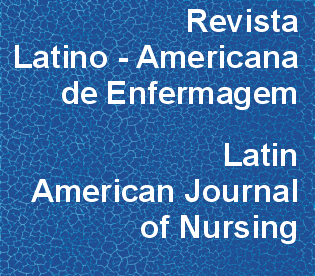Professional nursing practice: environment and emotional exhaustion among intensive care nurses
DOI:
https://doi.org/10.1590/S0104-11692013000300016Abstract
OBJECTIVE: to evaluate the characteristics of the professional nursing practice environment and its relationship with burnout, perception of quality of care, job satisfaction and the intention to leave the job in the next 12 months. METHOD: cross-sectional study with a quantitative approach to data. The sample was composed of 129 nurses working in adult Intensive Care Units from a region in the interior of São Paulo, Brazil. RESULTS: The structural equation modeling, using path analysis, revealed that characteristics of the environment influence job satisfaction, perception of quality of care, and having an intention to leave their job, when mediated by emotional exhaustion. Nurses with limited autonomy, poor control over their practice, and poor relationships with physicians, experience a greater level of emotional exhaustion, which can negatively influence their perception of quality of care, job satisfaction and an intention to abandon their jobs. CONCLUSION: the mediating role of emotional exhaustion may negatively influence care delivery. Therefore, there is a need to adopt strategies to minimize this condition among nurses.Downloads
Download data is not yet available.
Downloads
Published
2013-06-01
Issue
Section
Original Articles
License
RLAE’s authorship concept is based on the substantial contribution by each of the individuals listed as authors, mainly in terms of conceiving and planning the research project, collecting or analyzing and interpreting data, writing and critical review. Indication of authors’ names under the article title is limited to six. If more, authors are listed on the online submission form under Acknowledgements. The possibility of including more than six authors will only be examined on multicenter studies, considering the explanations presented by the authors.Including names of authors whose contribution does not fit into the above criteria cannot be justified. Those names can be included in the Acknowledgements section.
Authors are fully responsible for the concepts disseminated in their manuscripts, which do not necessarily reflect the editors’ and editorial board’s opinion.
How to Cite
Professional nursing practice: environment and emotional exhaustion among intensive care nurses . (2013). Revista Latino-Americana De Enfermagem, 21(3), 765-772. https://doi.org/10.1590/S0104-11692013000300016



